Old wine in a new bottle
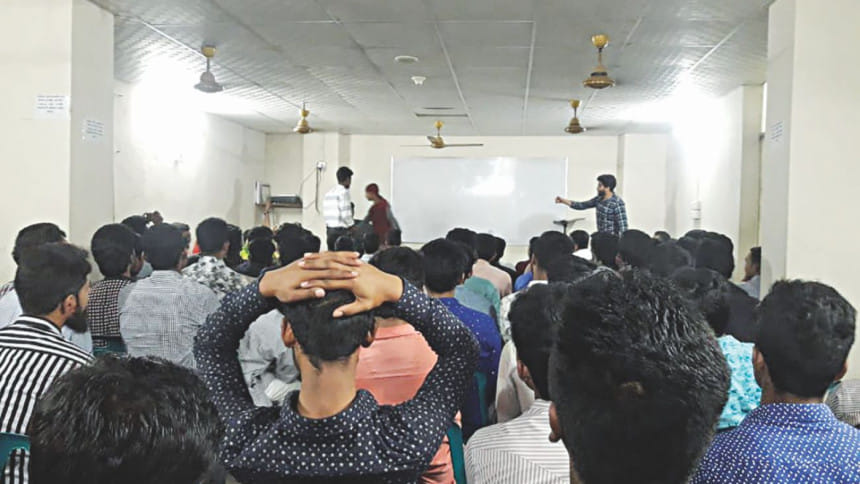
Sitting in a waiting room with around 15-16 people, in an office named Gazipur City Agency located on the 4th floor of the RAJUK zonal office, you could feel the palpable tension of the interviewees waiting to be called in. The staff tried to reassure them that this job could change their life within a very short time—but they could only get the job after passing an interview with senior officials.
I, too, sat with the candidates, waiting for my turn. I was recruited for this by a senior marketing officer of the company, who approached me with the prospect of a job in management, with a salary of Tk 17,600, and free accommodation. All I needed in order to secure this future was Tk 50,000. The money, he said, was a refundable security deposit.
Remember the whole Destiny 2000 Ltd scam where a company embezzled Tk 5,113 crore 95 lakh from people by asking them to invest in non-existent ventures? In 2013, this debacle blew up shedding light on a burgeoning industry of multilevel marketing (MLM) companies that cheated lakhs of people of their hard-earned money through something called "pyramid schemes". A pyramid scheme is where people are cheated into paying to get involved in a shady business—this can mean buying products that don't exist, or investing in ventures with no returns.
In 2013, the government banned pyramid marketing by passing the Multilevel Marketing (MLM) Activities Control Ordinance 2013. They did this because lakhs of people were being cheated by MLM companies such as Destiny 2000, Unipay2u, ITCL and many more. Meanwhile, the members at the top of the pyramid made a huge amount of money by embezzling from their clients.
After introduction of the Ordinance, the fraudulent activities of MLM businesses did go down. But it appears they are back in business—simply with a new name and a new game. The new model targets unemployed, little-educated youth from rural areas. Companies calling themselves "marketing companies" promise jobs to people, in exchange for payment of Tk 30,000 to 50,000 in cash.
I went undercover in one such agency. An employee of the company gave me the lead—he told me that his company was involved in fraudulent activities, and that they were offering non-existent jobs to jobseekers and making money off of them. Then a while into the "job", the newly-recruited employees were given a target—they had to recruit people into the company. The employee who approached me had been asked to do the same after being taken into the job.
So, I went in, pretending to be a newly-divorced woman who only had a high-school degree and now needed to earn her keep.
After waiting for around 20 minutes in the waiting room, someone came and asked me whether I had brought my necessary documents, including four sets of photos, a copy of my NID, and educational certificates. He then asked for Tk 550 for the application form. After a few more minutes, the staff member who had spoken to me over the phone came and took his seat in the waiting room. He then took a small interview, asking me some basic general knowledge questions. "What day is February 21?" he asked. I passed the interview with flying colours.
After the interview, he asked me whether I had brought the "security deposit". When I replied that I was able to manage only half the required amount, he seemed miffed. "I'm going to arrange another interview for you with one of our senior employees. After that interview, you have to pay the whole amount. If you want to secure your job, you have to pay the money to him right away. I will tell the boss that you will provide the rest of the money soon," he said.
I gingerly entered the next interview room. A man asked for my personal details and work history. He also then proceeded to ask me a few general knowledge questions. I intentionally gave wrong answers to test whether they are truly looking for qualified candidates.
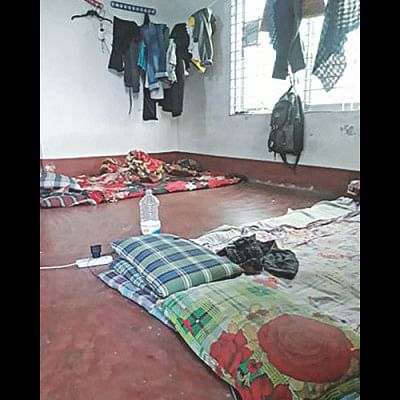
"I know you cannot answer my questions because you have dropped out from your studies for long years now but I'm still giving you an opportunity," he said at last, "but you have to pay Tk 50,000 within half an hour. Otherwise, we will replace you with someone else."
His words confirmed my suspicions. I needed to get out of the room and needed a pretext. All employees have to live on-site. I decided to jump on that as an excuse.
"Can I commute from home?" I asked.
"No, it is mandatory for all," he said.
"Then I have to talk to my brother waiting outside," I replied.
After that, I came out of the room and demanded to see the living quarters—my main aim was to talk to some of the present employees. I was taken into a building, where eight women live in a two-room flat. There were no beds and damp clothes hung from clotheslines inside the rooms. I asked a woman in her early 20s, about her job. She said it was a "management job", but couldn't explain what she actually did in the company. It was also unclear why they were all there during working hours.
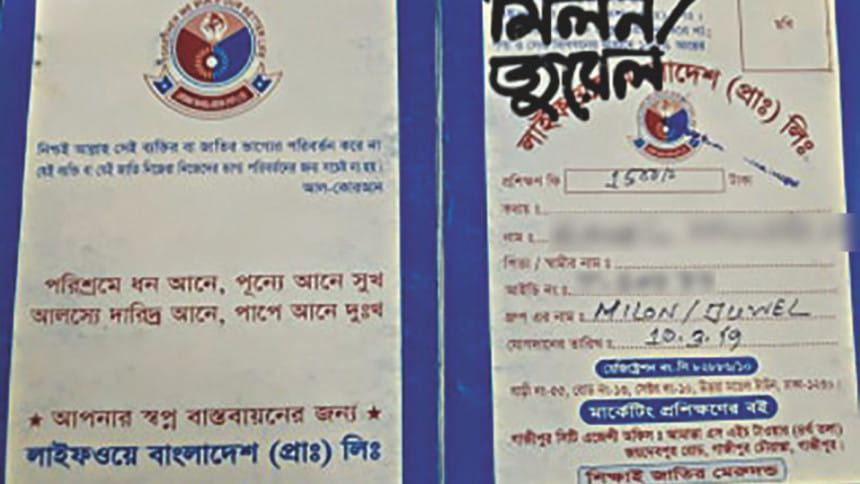
Once out of the flat, I told the recruiter that I didn't like the living quarters and so wouldn't be taking the job. Using that as an excuse, I left.
But these are the important things I found out about the company.
There was no signboard of the establishment. They didn't allow me to see and sign the application form, and no one was wearing an ID card. The company goes by 'Gazipur City Agency' in that branch but I found some brochures and application forms inside the office with the name of a company called Lifeway Bangladesh (Pvt) Ltd. Alamin Jewel, a senior employee of the Gazipur branch, says, they currently have 53 branches in Uttara, Gazipur, Tongi, Jatrabari, Savar, Cumilla and Chattogram.
Former employees I interviewed say that each branch operates under a different name, such as City Electronics, Nova Company, IMG Electronics, City Group of Company, Umbrella Outsourcing and so on. According to them, most of the branches in the greater Dhaka area accommodate nearly 300 gullible job seekers and takes money in the name of a refundable security fee from each of them. The money is never refunded. If the victims' statements are accurate, Lifeway could have embezzled approximately Tk 42 crores from gullible job seekers.
According to the Registrar of Joint Stock Companies and Firms (RJSC)—the sole authority to facilitate the formation of companies and keep track of all ownership related issues prescribed by the laws in Bangladesh—Lifeway Bangladesh (Pvt) Limited was registered under the Companies Act 1994 in 2010. As per the memorandum, the company was registered to carry on the business of general trading/multilevel marketing/direct sales marketing/network marketing and home-based marketing of electrical and electronic goods. After approval of the Multi-Level Marketing Control Act 2013, Lifeway again applied for a license to operate MLM business in the country in 2014, but was rejected by the RJSC.
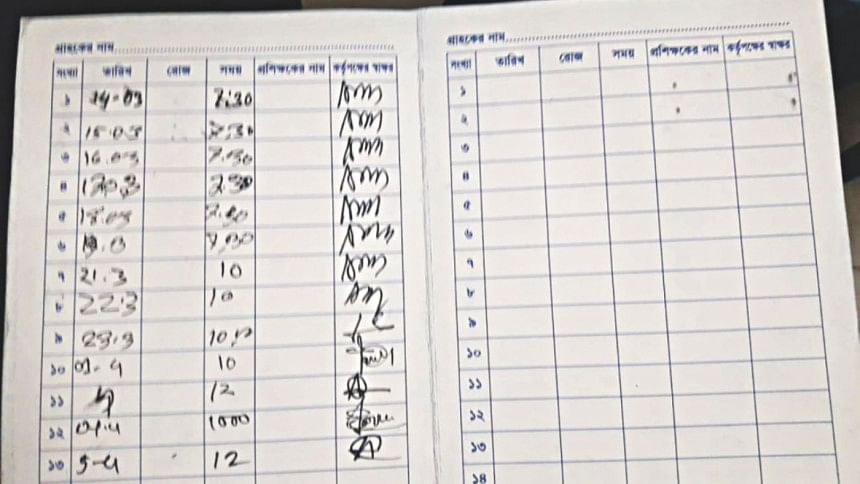
Selim Fakir, the zonal executive director (Uttara) of Dhaka North City Corporation (DNCC), and KM Rahatul Islam, the chief executive officer of Gazipur City Corporation (GCP), both state that Lifeway Bangladesh (Pvt) Limited didn't take any trade license from the DNCC and GCP respectively.
***
But what happened when someone paid the money and joined the job?
According to Rafiqul Islam, one of the cheated employees of Lifeway Bangladesh (Pvt) Limited, he was told he would be selling electronics, fabrics and ceramic products, but after his appointment, the company ordered him to undergo a training along with more than 300 newly appointed people. During his second week of training, many of the trainees started asking when they would actually start working. Some of them had been receiving the training for more than six months, with no fixed responsibilities in reality.
"The trainers would tell us that we would be informed about our job soon. According to them, our first duty was to bring two people to the company with the promise of giving them jobs. They also gave us a target to call seven unemployed people a day from our contact list, and tell them, 'Hello, how are you? I have been doing a job in a company run by the Bangladesh Army and doing great. If you need anything, please don't hesitate to call me'," remembers Rafiqul. "That's when I realised that I was trapped and that my recruiter had been duty-bound to persuade me to do this job. They didn't even allow us to talk to anyone outside the office. Whenever we needed to go outside of our residential facilities for anything, they appointed someone to escort us. There was a constant pressure to bring in new people," he shares.
According to Rafiqul, if anyone can bring in a job seeker who agrees to pay Tk 30,000 to 50,000 as a security fee, he gets Tk 3,500 as commission. There is no fixed salary—the more people a person can engage, the more commission s/he gets. The successful employees were taken to different theme parks as a reward.
On his 14th day on the job, Rafiqul made up his mind not to work for the company anymore and shared his decision with the authorities. They gave him a 17-inch LED TV and a rice cooker, instead of paying back his money. The company made him sign an agreement stating that he had no further claim with the company.
***
Rafiqul was lucky that he received something at least. Of the 10 other victims I interviewed, eight of them received nothing when they resigned from their jobs. Five of them were threatened with police cases if they spoke to others about what had happened to them at the company; one was threatened with a defamation case worth Tk 3 crore for ruining the reputation of the company by disseminating defamatory information among the employees; and one was blamed for stealing Tk 4 lakh from the company when he left.
Four of our interviewees also claim that the company introduced themselves as being run by several army personnel. If anyone protested, they said the company used the name of the Bangladesh Army, locally influential people, or the local administration, to threaten them with dire consequences. "After coming back, I angrily sent some messages to the person who took me there, but somehow the authorities saw everything I sent. After that, they called me and claimed that I had stolen Tk 4 lakhs from them, while leaving the office. Since I belong to a very poor family, my father became frightened and forbade me to contact them for the money we had paid," says Billah.
Although the company tried to scare the employees by mentioning their association with the Bangladesh Army or retired army generals, Lieutenant Colonel Abdulla Ibn Zayed, Director, Inter Service Public Relation (ISPR) Directorate, the media wing of the Bangladesh Armed Forces, says there is no scope for any army personnel to be associated with such fraudulent activities.
H Chakma, who claims to have been cheated by this company and threatened with legal action if he took measures against the company, informs Star Weekend that those who cannot find job seekers are eventually sacked from the office, empty-handed. If someone refuses to make such calls, the authorities misbehave with them and stop providing them with food. "That's why I left," he says. "They mostly target people hailing from rural areas with minimal education. Most of the people I knew came there by borrowing money from relatives, selling livestock or gold," he adds.
But the question remains—how is this company hoodwinking so many innocent job-seekers while dodging the local administrations and law enforcers?
Dewan Md Humayun Kabir, deputy commissioner of Gazipur, says that he is aware of the fraudulent activities of the said company. "We sent the case to the mobile court last year but it was dismissed due to lack of evidence. We are ready to take action through RAB if we receive specific information."
Meanwhile, last year on April 28, a team of RAB-11 arrested 28 members of this fraud company and filed a case with Uttara West Police Station. Gazi Alamgir, the investigation officer of the case, says the accused are out on bail.
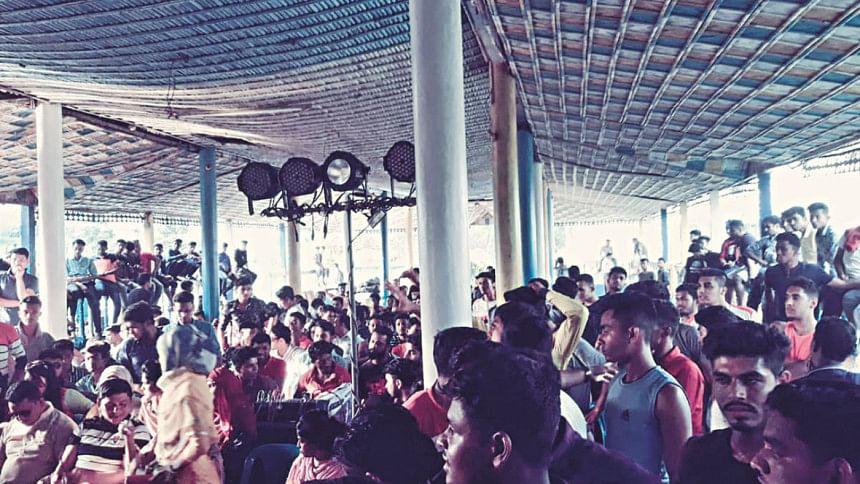
According to ASP Jashimuddin of RAB-11, this business is chiefly run by a dismissed army private. "We are aware that the company is cheating people with different names and forms. But since we don't have any specific information, we cannot take action," he says.
ASP Salahuddin of RAB-1, on March 16 last year, also arrested six persons involved with this company, but according to the duty officers of the Uttara West Police Station, the case is still under investigation.
Based on the experiences of dealing with fraudulent activities, ASP Salahuddin of RAB-1 argues that since the punishment is minimal for such fraudulent cases; the perpetrators can easily get bail from the court for such offenses and revamp their business in full swing. "This is why people must be more aware. News reports with special highlights can help them to know more about these fraudulent activities," he says.

 For all latest news, follow The Daily Star's Google News channel.
For all latest news, follow The Daily Star's Google News channel. 



Comments